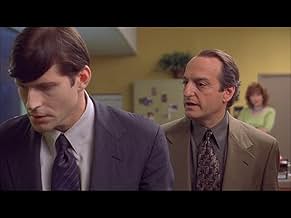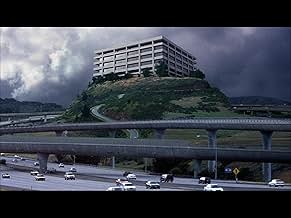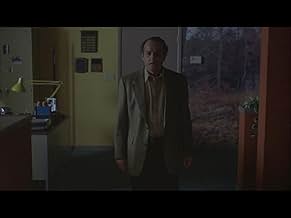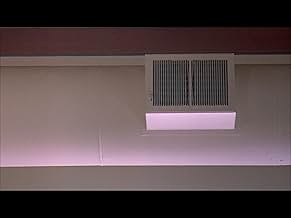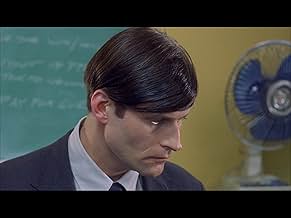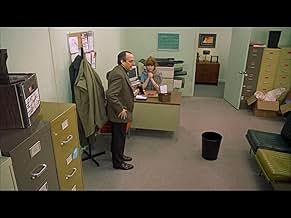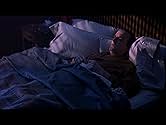AVALIAÇÃO DA IMDb
6,4/10
2,3 mil
SUA AVALIAÇÃO
Adicionar um enredo no seu idiomaA clueless boss has no idea what to do with his mundane office worker whose refusal of duties only gets worse each passing minute.A clueless boss has no idea what to do with his mundane office worker whose refusal of duties only gets worse each passing minute.A clueless boss has no idea what to do with his mundane office worker whose refusal of duties only gets worse each passing minute.
- Direção
- Roteiristas
- Artistas
- Prêmios
- 1 indicação no total
Stu Klitsner
- Professor Bum
- (as Stuart Klitsner)
Catherine DiNapoli
- Rocky's Girlfriend
- (as Catherine di Napoli)
- Direção
- Roteiristas
- Elenco e equipe completos
- Produção, bilheteria e muito mais no IMDbPro
Avaliações em destaque
I loved this film and I cannot believe how so few critics liked it. What were they thinking? Apparently one critic thought since it was based on a short story that the film should be shorter. Of course, once one critic says its too long, every other critic has to agree. I guess David Mamet is an exception to the rule. Bartleby is not too long. It deserves it's running time so that we can absorb the story more closely. When we hear Bartleby repeat the same words: "I'd prefer not to" we are not given any explanation for the comment but yet it becomes extremely poignant. Eventually everyone in the office begins to use the word "prefer" and we see how Bartleby has affected the workplace like a disease. The film is very bizarre particularly because of the way the boss reacts to Bartleby. Instead of just firing the guy for not doing his job, he tries to reason with him. Eventually Barlteby gets in an even more bizarre predicament that has even more to do with just "prefering not to" work. The boss is obsessed with Bartleby and the film turns very Kafkaesque. We see a capitalist scenario where people topple on another for greed, power and respect. The film is based on the short story "Bartleby the Scrivener" by Herman Melville. It was appropriate to mention the source because the story seems very relevant not only to our modern culture but also to what Melville went after writing Moby Dick. The film also has a wonderful score with a Theramin instrument and a brilliant cinematography.
I found this movie disturbing. Advertised as a comedy, it is no such thing. There is a lot of comedy in there, all right, but overall the themes are heavy, disturbing, even horrific. Crispin Glover's performance is flawless, and his role in the story is to pose a lot of questions that never get answered. The story revolves around the other characters' failure to figure him out. The new employee at the Public Records Office in an unnamed city starts out doing a great job, but he does less and less work as time goes on until he is spending most of his time refusing requests to perform any job tasks, or simply gazing up into the air-conditioning vent. They fire him, but he doesn't leave. It gets worse from there, believe me.
7B24
The film touches on some parts of the original story very aptly. I thought the Chaykin-Piscopo match was very close indeed to what Melville intended. As to Crispin Glover, no other movie actor of his stature is creepy enough and palpably slow-witted enough to fit the role -- not even the younger editions of a Brando or Hopper or Walken, who would overact monstrously in one form or another.
Most viewers seem to surrender to the misconception that the story is all about Bartleby. In fact, the narrator undergoes the most profound change within its context. And in that sense this film version fails because the Paymer character is made out to be a complete sap, rather than the seriously introspective and well-educated man of the original.
No one in 1853 knew anything of co-dependency in relation to addictions and other mental disorders, but Melville was prescient in that regard. The apparent despondency of Bartleby (characterized in the original as late of the Dead Letter Office) has no bounds, but it is in his employer's character we are led to see that this relatively new concept involving an excess of identification with the subject person can result in similar debilitation on the part of the caregiver.
It falls as well into the category of feature-length films based on short stories destroyed by too much padding and extraneous activity we used to call "stage business." It should be as spare as the slowly emptying mind of Bartleby himself.
Most viewers seem to surrender to the misconception that the story is all about Bartleby. In fact, the narrator undergoes the most profound change within its context. And in that sense this film version fails because the Paymer character is made out to be a complete sap, rather than the seriously introspective and well-educated man of the original.
No one in 1853 knew anything of co-dependency in relation to addictions and other mental disorders, but Melville was prescient in that regard. The apparent despondency of Bartleby (characterized in the original as late of the Dead Letter Office) has no bounds, but it is in his employer's character we are led to see that this relatively new concept involving an excess of identification with the subject person can result in similar debilitation on the part of the caregiver.
It falls as well into the category of feature-length films based on short stories destroyed by too much padding and extraneous activity we used to call "stage business." It should be as spare as the slowly emptying mind of Bartleby himself.
I never heard of this movie until couple of weeks ago when I saw it on TV. This brings my question - where do all the good, "small", independent movies go after they've been created and screened on the Sundance Film Festival? How do we learn about their existence? Where do we read about them? And most importantly, where can we see them?
Bartleby, the first film directed and written by Jonathan Parker is a real gem - modern version of the Melville's short story "Bartleby the Scrivener" with absolutely amazing cast.
Crispin Glover plays Bartleby, the man who was hired, but preferred not to work and who was fired, but preferred not to leave. David Paymer is his clueless boss who tries to understand what he is dealing with. Glenne Headly is Vivian, an office secretary, the woman of many adorable talents; Maury Chaykin, and Joe Piscopo are his coworkers in the one of the most boring office ever existed. The office is located in the building that sits on the top of the hill and comes directly from the El Greco's painting "View of Toledo" with its atmosphere of mystery, danger, and loneliness: Would you like to work in the building like that? I'd prefer not to...
I believe Parker made a very impressive debut - the film is creatively shot, the use of music is amazing - Beethoven's sonata turns into a creepy, quirky and moody Bartleby's theme for which Parker used theremin - very interesting and unique musical instrument. Parker and his co -writer transported 'Bartleby the Scrivener' into a surreal and absurd black comedy - satire on bureaucracy and alienation in the insane and cruel modern world.
Franz Kafka's name came to my mind more than once while watching the film - he would've loved that absurd, funny but dark and sad story. Also, if ever a good movie is made about one of the greatest and tragic writers of 20th Century, Crispin Glover should play him. Just compare their pictures...
Bartleby, the first film directed and written by Jonathan Parker is a real gem - modern version of the Melville's short story "Bartleby the Scrivener" with absolutely amazing cast.
Crispin Glover plays Bartleby, the man who was hired, but preferred not to work and who was fired, but preferred not to leave. David Paymer is his clueless boss who tries to understand what he is dealing with. Glenne Headly is Vivian, an office secretary, the woman of many adorable talents; Maury Chaykin, and Joe Piscopo are his coworkers in the one of the most boring office ever existed. The office is located in the building that sits on the top of the hill and comes directly from the El Greco's painting "View of Toledo" with its atmosphere of mystery, danger, and loneliness: Would you like to work in the building like that? I'd prefer not to...
I believe Parker made a very impressive debut - the film is creatively shot, the use of music is amazing - Beethoven's sonata turns into a creepy, quirky and moody Bartleby's theme for which Parker used theremin - very interesting and unique musical instrument. Parker and his co -writer transported 'Bartleby the Scrivener' into a surreal and absurd black comedy - satire on bureaucracy and alienation in the insane and cruel modern world.
Franz Kafka's name came to my mind more than once while watching the film - he would've loved that absurd, funny but dark and sad story. Also, if ever a good movie is made about one of the greatest and tragic writers of 20th Century, Crispin Glover should play him. Just compare their pictures...
Herman Melville's short story "Bartleby the Scrivener" gets a slightly surreal update in this offbeat comedy drama. The manager (David Paymer) of the city records department in a mid-sized California community decides that his staff of three - flirty chatterbox Vivian (Glenne Headly), sloppy Vietnam vet Ernie (Maury Chaykin), and slick-suited, Don Juan wannabe Rocky (Joe Piscopo) - could use some help, so he places an ad looking for a new employee. The boss ends up hiring the one and only applicant who wants the position, a quiet, pale young man named Bartleby (Crispin Glover).
At first, Bartleby is a model of efficiency, but before long he loses enthusiasm for his job, much to the annoyance of his co-workers, and soon he's spending his days staring at an air conditioning vent. The Boss asks Bartleby to get back to work, but Bartleby's repeated reply to such requests is, "I prefer not to," and the Boss sees little recourse but to fire him.
However, Bartleby refuses to leave his desk, and it soon becomes obvious that Bartleby has not only stopped doing his work - he's stopped going home and has moved into the office. Bartleby was the first feature film for producer/director Parker. He also wrote the screenplay, in collaboration with Catherine Di Napoli.
There is really not enough material in Melville's story to warrant a feature length film. When "Bartleby" sticks to the text of the story it is interesting and fairly funny, but Parker is forced to add a lot of filler which is simply not very good. Worth a look, but in the end, a bit weak.
At first, Bartleby is a model of efficiency, but before long he loses enthusiasm for his job, much to the annoyance of his co-workers, and soon he's spending his days staring at an air conditioning vent. The Boss asks Bartleby to get back to work, but Bartleby's repeated reply to such requests is, "I prefer not to," and the Boss sees little recourse but to fire him.
However, Bartleby refuses to leave his desk, and it soon becomes obvious that Bartleby has not only stopped doing his work - he's stopped going home and has moved into the office. Bartleby was the first feature film for producer/director Parker. He also wrote the screenplay, in collaboration with Catherine Di Napoli.
There is really not enough material in Melville's story to warrant a feature length film. When "Bartleby" sticks to the text of the story it is interesting and fairly funny, but Parker is forced to add a lot of filler which is simply not very good. Worth a look, but in the end, a bit weak.
Você sabia?
- CuriosidadesDick Martin's final acting performance.
- Erros de gravaçãoWhen "The Boss" goes to check out a new place for their office, he settles on a place with no electrical outlets on 3 of the walls. (The 4th wall is not shown) There's a Xerox and every desk has a computer. This arrangement would be completely unacceptable for any office manager.
- Cenas durante ou pós-créditosBefore the opening credits begin, viewers are given a portrait and short biography of Herman Melville, upon whose story the film is loosely based.
- ConexõesReferenced in Stargate: Atlantis: The Lost Boys (2005)
- Trilhas sonorasPhantasie #3 In D Minor
Written by Wolfgang Amadeus Mozart (as Mozart)
Background music on piano by Nancy Spottiswoode
Principais escolhas
Faça login para avaliar e ver a lista de recomendações personalizadas
- How long is Bartleby?Fornecido pela Alexa
Detalhes
- Data de lançamento
- País de origem
- Central de atendimento oficial
- Idioma
- Também conhecido como
- Bartleby at the Office
- Locações de filme
- Empresa de produção
- Consulte mais créditos da empresa na IMDbPro
Bilheteria
- Faturamento bruto nos EUA e Canadá
- US$ 148.479
- Fim de semana de estreia nos EUA e Canadá
- US$ 14.599
- 27 de mai. de 2002
- Faturamento bruto mundial
- US$ 148.479
Contribua para esta página
Sugerir uma alteração ou adicionar conteúdo ausente


